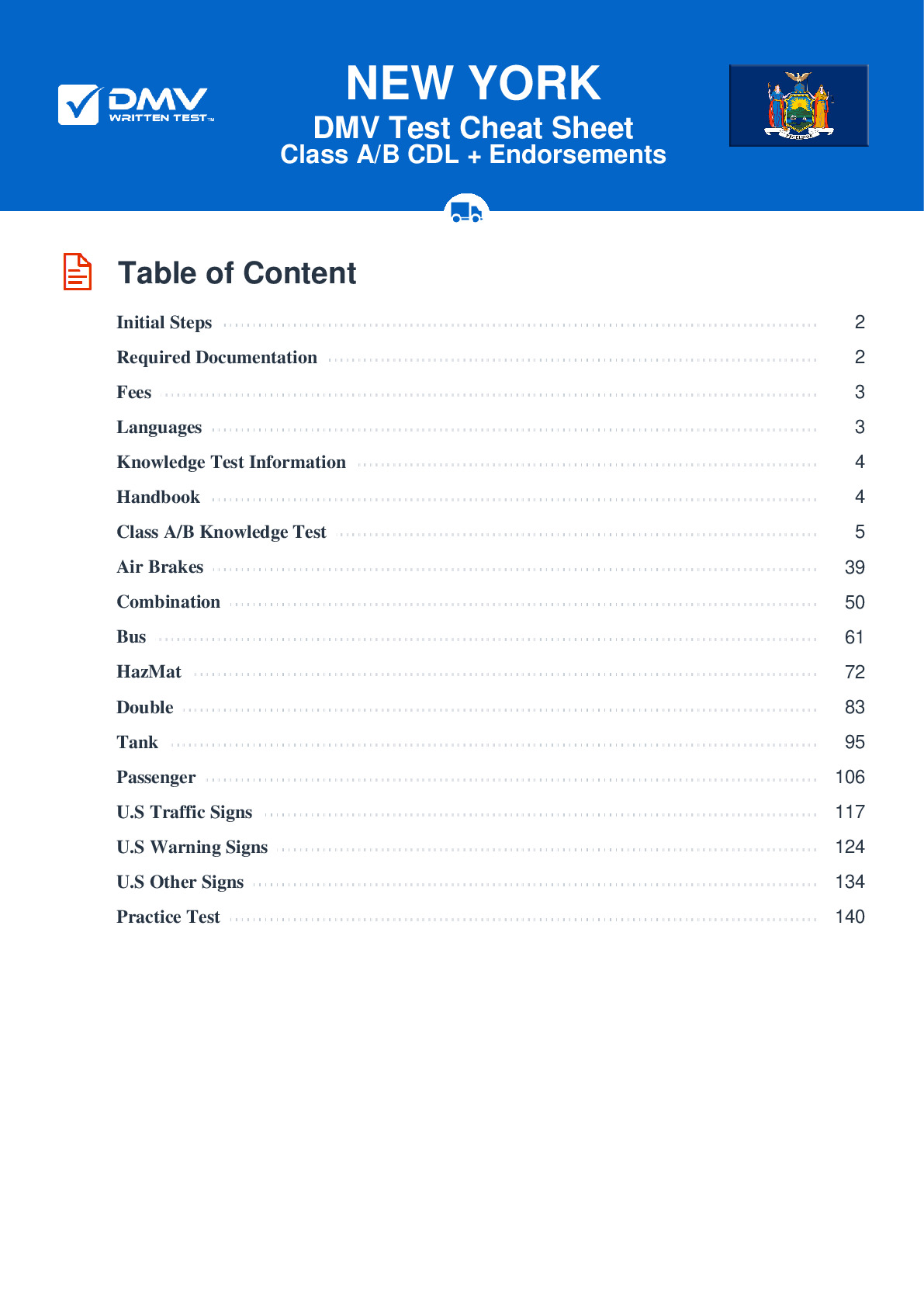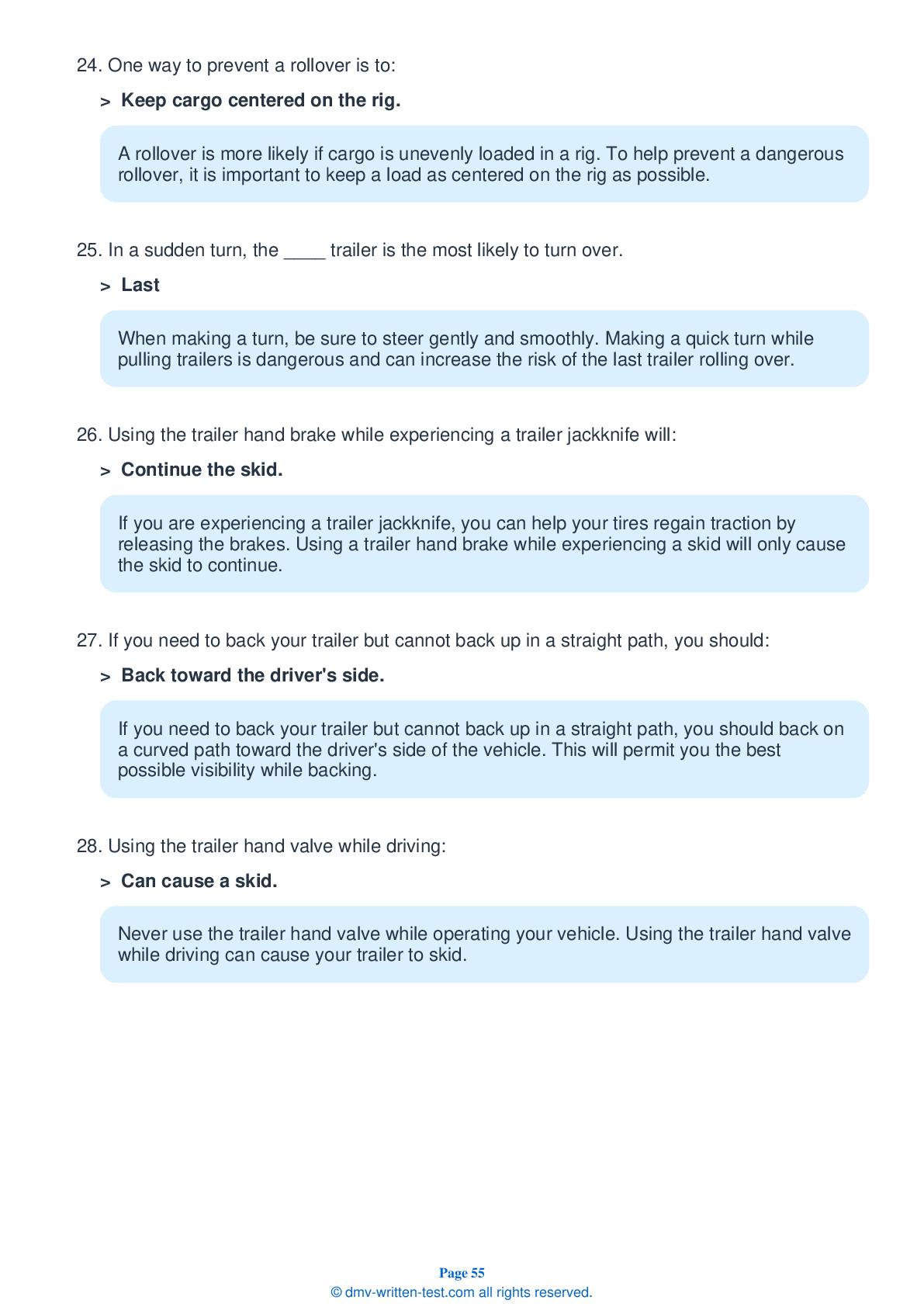Knowledge Test Class B
This license is required for driving a single vehicle with a GVWR of more than 26,001 pounds, and a trailer not to exceed 10,000 pounds gross vehicle weight rating, or a vehicle designed to transport 24 or more people (including the driver). To receive this license, applicants must pass a 50-question test. Each question has four answer choices. To pass, applicants must answer 40 questions correctly. Test questions come from the New York State Commercial Motor Vehicle Drivers Handbook. Questions come from chapters covering: Introduction, Driving Safely, Transporting Cargo Safely, Air Brakes (if applicable), Combination Vehicles, Pre-Trip Vehicle Inspection Test, Basic Vehicle Control Skills Test and On-Road Driving. Endorsements that may be used with a Class B CDL are: Hazardous materials, Tank, Passenger, HazMat and Tank, Air Brakes and School bus.
43. Vehicles with dual air brake systems:
Before driving a vehicle with a dual air brake system, you must allow the air compressor time to build up at least 100 psi of air pressure in both the primary and secondary systems.
44. Be sure you are always driving so your vehicle can stop:
Always be sure that you are driving in a manner that will allow your vehicle to come to a complete stop, if necessary, within the area of the road ahead that you are able to see.
45. When conducting a vehicle inspection, you will need to identify all of the following, except:
During the vehicle inspection test, you must check the power steering belt, water pump belt, alternator belt, and air compressor belt for snugness, cracks, or frays. If any of these components are not belt-driven, you must tell the examiner which one(s), and verify that they are operating properly, mounted securely, and not damaged or leaking.
46. Why do you need to drain air tanks regularly?
Compressed air in an air brake system usually contains a certain amount of water and compressor oil. The water and oil can damage the brakes if left to accumulate in the system. Tanks must be drained regularly to remove this build-up.
47. Fuel records supporting IFTA quarterly fuel use tax returns must be kept by carriers for:
In general, if you operate a commercial vehicle in interstate commerce, it must be registered under the International Registration Plan (IRP) and International Fuel Tax Agreement (IFTA). These programs collect and distribute vehicle registration fees and fuel taxes based on what jurisdictions you drive in and for how long. Mileage and fuel records supporting IFTA quarterly fuel tax returns must be retained by carriers for four years.
48. The most important reason to inspect your vehicle before a trip is:
The most important reason to inspect your vehicle before a trip is to ensure the safety of yourself and others on the road. Safety inspections before every trip are required by state and federal laws.
49. What is the purpose of a vehicle inspection report?
A vehicle inspection report allows a driver to inform the motor carrier of issues that could affect the safe operation of a vehicle. If required, the driver should fill out a vehicle inspection report after every day of driving. They should make note of any issues that could affect the safety of the vehicle or that could lead to a mechanical breakdown.
50. When checking the engine compartment:
Before inspecting the engine compartment, make sure that the parking brakes are on and/or the wheels are chocked. Check the engine compartment before entering the cab and starting the engine.
Frequently Asked Questions
To obtain a Class B CDL license in New York, you will need to:
1. Be at least 18 years old.
2. Hold a valid New York State driver's license.
3. Obtain a commercial learner's permit (CLP) by passing the general knowledge and specific endorsement exams.
4. Complete any required training or endorsements for the type of vehicle you intend to drive.
5. Pass a road test in the type of vehicle you intend to drive.
6. Pay the appropriate fees.
It is important to note that there may be additional requirements depending on the specific type of commercial vehicle you intend to drive, such as passing additional endorsement exams or meeting medical requirements.
Some examples of vehicles you can operate with a Class B CDL license in New York include:
- Straight trucks (such as delivery trucks and dump trucks) with a GVWR of 26,001 pounds or more
- Large buses (such as school buses and passenger buses) designed to transport more than 15 passengers
- Segmental buses
- Box trucks and cube vans with attached trailers not exceeding 10,000 pounds GVWR
It is important to note that there may be additional endorsements or certifications required for certain types of commercial vehicles, such as hazardous materials or passenger endorsements.
It's important to note that some employers may have their own age requirements and may prefer drivers who are at least 21 years old. Additionally, certain types of commercial vehicles may require drivers to be at least 21 years old, such as those that transport hazardous materials or are involved in interstate commerce.
1. Passenger endorsement: This endorsement is required if you will be operating a vehicle designed to transport 16 or more passengers, including the driver.
2. School bus endorsement: If you will be operating a school bus, you will need this endorsement on your Class B CDL.
3. Tanker endorsement: This endorsement is required if you will be operating a vehicle that is designed to transport liquid or gaseous materials in tanks.
4. Hazardous materials endorsement: If you will be transporting hazardous materials, you will need this endorsement.
The specific endorsements required for your Class B CDL will depend on the type of commercial vehicle you plan to operate and the cargo you plan to transport. You may also need to pass additional knowledge and skills tests for each endorsement.
1. Pre-trip inspection: You will be asked to perform a thorough inspection of your commercial vehicle to ensure that it is safe and in good working condition. This includes checking the brakes, steering, suspension, tires, lights, and other safety features.
2. Basic vehicle control skills test: You will be asked to demonstrate your ability to control your commercial vehicle in a variety of situations, such as backing up, turning, and parking.
3. On-road driving test: You will be asked to drive your commercial vehicle on public roads while demonstrating your ability to safely operate the vehicle in traffic. This includes obeying traffic laws, using proper signals, and making safe lane changes.
During the entire test, you will be graded on your ability to safely operate your commercial vehicle and follow proper procedures. It's important to practice and prepare for the Class B CDL skills test in order to increase your chances of passing on your first attempt.
1. Vehicle type: A driver with a Class B CDL is only allowed to operate single vehicles with a gross vehicle weight rating (GVWR) of 26,001 pounds or more, or a combination of vehicles with a GVWR of less than 26,001 pounds towing a trailer with a GVWR of less than 10,000 pounds.
2. Passenger carrying: If you do not have a passenger endorsement on your Class B CDL, you are not allowed to operate a vehicle designed to transport 16 or more passengers (including the driver).
3. Hazardous materials: If you do not have a hazardous materials endorsement on your Class B CDL, you are not allowed to transport hazardous materials.
4. Air brakes: If you do not have an air brake endorsement on your Class B CDL, you are not allowed to operate vehicles with air brakes.
5. Time limitations: Some employers may have their own time limitations for drivers with a Class B CDL license, such as restrictions on how many hours you can drive per day or per week.
It's important to be aware of any restrictions or limitations that apply to your Class B CDL license and to follow all regulations in order to maintain your license and drive safely.
However, if you choose to take the test in a language other than English, you will need to bring an interpreter with you to translate the questions and answers. The interpreter must be at least 18 years old and cannot be a family member or business associate. You will also need to pay an additional fee for the interpreter.
It's important to note that even if you take the written test in a language other than English, you will still need to demonstrate your ability to read and understand English during the road test. This is because road signs and other important driving information are typically presented in English.
To request accommodations for the Class B CDL written test, you will need to fill out and submit a Request for Accommodations form to the DMV. This form is available on the DMV's website or at any DMV office. The form must be completed by you and your healthcare provider, who can provide documentation of your disability and any recommended accommodations.
Some examples of accommodations that may be available include additional testing time, a separate testing room, or special equipment or software. The DMV will review your request and determine what accommodations are appropriate based on your individual needs.
It's important to note that requests for accommodations must be made in advance of the scheduled test date. If you have any questions about requesting accommodations for the Class B CDL written test, you can contact the DMV's Disability Rights Coordinator at (518) 473-9550 or by email at drccoordinator@dmv.ny.gov.
In New York, you are allowed to take the written test three times in one day. If you fail the test three times in one day, you will need to wait until the following day to retake the test. If you fail the test three times on three separate days, you will need to wait at least 7 days before retaking the test.
When you retake the written test, you will need to pay the testing fee again. It's important to note that if you fail the written test three times, you will not be able to take the road test until you pass the written test.
It's a good idea to study and prepare thoroughly for the Class B CDL written test before taking it. The New York State Department of Motor Vehicles (DMV) provides a free Commercial Driver's Manual that covers all of the information you'll need to know for the written test. You can also find practice tests online or at your local DMV office.




